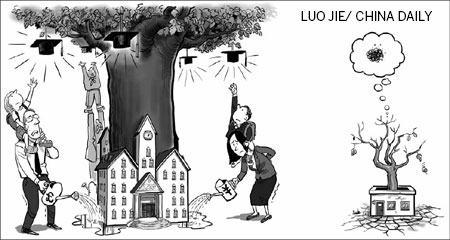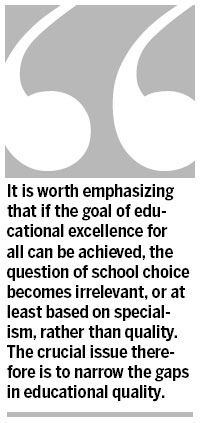Fairer access to quality schools
Updated: 2012-07-04 08:17
By Sally Thomas (China Daily)
|
||||||||


Around the world societies are struggling with the same education dilemma: what is the best system to distribute state-funded school places to children in a way that enhances both the equity and quality of education?
One key question is: should the system focus scarce resources on the most able children through selective schools or distribute resources fairly for the benefit of all through comprehensive mixed-ability schools? Governments have responded in various ways to this challenge, but not surprisingly poorer countries tend toward the former approach and richer countries toward the latter. However, whatever the system in place, parents will always seek the best school for their children, which raises the important issue of school choice.
In some countries, such as in the United Kingdom, parents are asked to state a preference for their chosen school. However, this preference will only be granted automatically if the school is undersubscribed, or in other words unpopular. For popular schools the key criteria for student entry are whether the student has special needs; a sibling currently attending the school or how near the student lives to the school, often down to the nearest centimeter. A small number of schools will hold a lottery if places are oversubscribed. Of course, parents can choose a private or independently funded school outside state provision, if they have the ability to pay. And wealthier parents can also "choose" a school for their child by moving house to a particular school's catchment area or through paying for extra tuition in a specialist subject, such as music or sport, that may open the door to specialized school scholarships. Some parents in the UK even resort to dubious or even illegal strategies to meet particular school selection criteria and gain a place at an excellent state school, thereby avoiding the costs of private education. These strategies include giving a false home address by temporarily renting a property nearby or giving the address of a relative or friend. However, the stakes are high, as if the deception is discovered it may be too late to find another school place and the parent may be prosecuted.
In China, two UKAID projects focusing on improving educational quality, evaluation and teacher development, led by the University of Bristol in the UK and China's National Institute of Education Sciences, have explored the range of selection criteria used by a sample of Chinese senior secondary schools.
The 2012 findings indicate that the percentage of school places taken by students paying the standard tuition fee ranges from 45-100 percent. The school places taken by students paying more than the standard tuition fee ranges from 0-44 percent, while those students paying less than the standard tuition fee ranges from 0-38 percent. Given all senior high schools select by ability, which of course restricts parental choice, this suggests that there is nevertheless a great deal of variation across different schools and regions in selection criteria and opportunities for parents to influence selection decisions by paying more than the standard tuition fees.
In areas where these opportunities are limited, it is also likely that private schooling will thrive. Equality of access and resources in the system therefore need to be urgently considered and addressed if China seeks to achieve a fairer, more balanced distribution of educational quality. Also there are justifiable and convincing arguments that any element of school choice or selection should be removed as this damages social cohesion and the potential to develop the excellence of all.
The availability of more transparent evidence of the overall quality and effectiveness of schools, as well as who gains places at the best schools will assist in funding the most disadvantaged students.
This kind of evidence is essential to inform the development of context specific approaches that respond to demands for quality, equity and choice in education. It is worth emphasizing that if the goal of educational excellence for all can be achieved, the question of school choice becomes irrelevant, or at least based on specialism, rather than quality. The crucial issue therefore is to narrow the gaps in educational quality.
The author is a professor at the Graduate School of Education at the University of Bristol in the UK.
(China Daily 07/04/2012 page9)

 Relief reaches isolated village
Relief reaches isolated village
 Rainfall poses new threats to quake-hit region
Rainfall poses new threats to quake-hit region
 Funerals begin for Boston bombing victims
Funerals begin for Boston bombing victims
 Quake takeaway from China's Air Force
Quake takeaway from China's Air Force
 Obama celebrates young inventors at science fair
Obama celebrates young inventors at science fair
 Earth Day marked around the world
Earth Day marked around the world
 Volunteer team helping students find sense of normalcy
Volunteer team helping students find sense of normalcy
 Ethnic groups quick to join rescue efforts
Ethnic groups quick to join rescue efforts
Most Viewed
Editor's Picks

|

|

|

|

|

|
Today's Top News
Health new priority for quake zone
Xi meets US top military officer
Japan's boats driven out of Diaoyu
China mulls online shopping legislation
Bird flu death toll rises to 22
Putin appoints new ambassador to China
Japanese ships blocked from Diaoyu Islands
Inspired by Guan, more Chinese pick up golf
US Weekly

|

|






